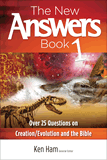
Pro-Evolution School Board to Vote on New Kansas Science Standards!
The timing may be coincidental, but it just so happens that the next Kansas state board of education meetings will begin on ‘Darwin Day’ February 12!
The timing may be coincidental, but it just so happens that the next Kansas (USA) state board of education meetings-during which newly drafted science standards containing many additional references to evolution will be discussed (and probably approved)-will begin on “Darwin Day,” February 12!
AiG has obtained a draft of the new “Science Education Standards” as composed by a state writing committee. The group has worked since the fall in an effort to insert more evolutionary teaching into the science classes of the public schools in Kansas.
This was in (over)reaction to a mild de-emphasis of evolution in the standards approved by the former board of education on August 1999. As we have reported on this Web site (see list of articles below), it was mistakenly thought by many Kansans (through a clever disinformation campaign by some evolutionists) that evolution had been omitted entirely from the science curriculum-which never happened. As a part of this overreaction, Kansans voted in new school board members who vowed to bring more evolutionary content to the state standards.
In the draft of the new standards that AiG has reviewed, the proposed changes are substantial and very pro-evolution:
- In the former standards approved, it was written that “science is the human activity of seeking logical explanations for what we observe in the world around us” (p. 4). The committee has removed the word “logical” and substituted the word “natural.” Some observers believe this is a direct challenge to creationists who believe that a “supernatural” element should not necessarily be excluded from inquiry.
- A paragraph has been added on how to deal with students (probably creationists) who raise questions in science classes that are outside the domain of science. Of course, evolutionists define science in their own exclusive terms, saying that anything supernatural falls outside science, thus removing the supernatural from any discussion at all.
- A whole new paragraph entitled “Patterns of cumulative change” has been added to give more of an evolutionary emphasis to the standards. It states in part: “Accumulated changes through time, some gradual and some sporadic, account for the present form and function of objects, organisms, and natural systems…. An example of cumulative change is the biological theory of evolution, which explains the process of descent with modification of organisms from common ancestors” (p. 10).
- Also, the phrase “biological evolution, gradual changes of characteristics of organisms over many generations” has been added (p. 38). Interestingly, in the same paragraph, the term “micro-evolution’* (which creationists accept - see our Q&A sections on speciation, natural selection and mutations) has been deleted.
- The evolutionary timeline of millions of years has been added: (a reference to 100 million years; p. 41).
- In the section of “Unifying concepts and processes” that should be known by students in grades 9-12, biological evolution has been added to the list of major topics that students should learn in life science. A new phrase (p. 58) “the theory of evolution is both the history of descent, with modifications of different lineages of organisms from common ancestors” (to be understood by students in grades 9-12) has been added. A variation of this phrase is also found on p. 72.
- On p. 59, the overarching false statement “evolution by natural selection is a broad, unifying theoretical framework in biology” has been inserted.
The new board members sworn in last month are immediately following up their promise to make the bankrupt evolutionary worldview even more prominent in Kansas’s public school classes. We trust, however, that educators in Kansas who oppose such an attempted indoctrination will realize that the new standards now under review are merely suggestions or guidelines for teachers to follow. In addition, teachers should possess enough academic freedom to teach the controversial topic of origins science as they see fit and, at the least, expose young people to the serious flaws in molecules-to-man evolution.
Recommended Resources

Answers in Genesis is an apologetics ministry, dedicated to helping Christians defend their faith and proclaim the good news of Jesus Christ.
- Customer Service 800.778.3390
- Available Monday–Friday | 9 AM–5 PM ET
- © 2026 Answers in Genesis



